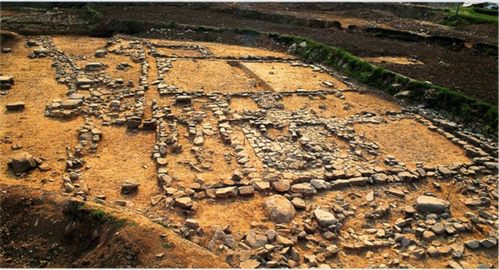"거제 고군현 치소지"의 두 판 사이의 차이
(→영문) |
|||
| (다른 사용자 한 명의 중간 판 3개는 보이지 않습니다) | |||
| 1번째 줄: | 1번째 줄: | ||
| − | |||
{{문화유산정보 | {{문화유산정보 | ||
|사진= | |사진= | ||
|사진출처= | |사진출처= | ||
|대표명칭=거제 고군현 치소지 | |대표명칭=거제 고군현 치소지 | ||
| − | |영문명칭= | + | |영문명칭=Local Government Office Site, Geoje |
|한자=巨濟 古都懸 治所址 | |한자=巨濟 古都懸 治所址 | ||
|주소=경상남도 거제시 둔덕면 거림리 285번지 외 | |주소=경상남도 거제시 둔덕면 거림리 285번지 외 | ||
| 34번째 줄: | 33번째 줄: | ||
'''Local Government Office Site, Geoje''' | '''Local Government Office Site, Geoje''' | ||
| − | These | + | These archaeological remains are presumed to be the site of the local government office of Sang-gun County (today’s Geoje City), which is said to have been established in the 7th century during the reign of King Munmu (r. 661-681) of the Silla kingdom (57 BCE-935 CE). The site was excavated in 1995 following the discovery of roof tile shards and large stones in the vicinity. |
| − | Several | + | Several archaeological findings at the site provide support for the hypothesis that this is indeed the site of the Silla-period government office. First, the site’s buildings were found to have been arranged parallel to one another facing south, following the traditional arrangement of government institutions. Furthermore, a roof tile shard inscribed with the name Sangsa-ri (possibly meaning “Village No. 4 of Sang-gun County”) was discovered at the site. At the nearby Dundeokgiseong Fortress (1.5 km to the northwest), two more roof tile shards inscribed with this name were found, suggesting a close connection between the two sites. |
| − | Other artifacts discovered at this site include earthenware, celadon, and ''buncheong'' ware from the Goryeo period (918-1392), | + | Other artifacts discovered at this site include Silla earthenware, as well as earthenware, celadon, and ''buncheong'' ware from the Goryeo period (918-1392), attesting to the site’s long history. |
| − | |||
| − | |||
| − | |||
| − | |||
===영문 해설 내용=== | ===영문 해설 내용=== | ||
| − | 이곳은 | + | 이곳은 신라 문무왕(재위 661-681) 때인 7세기에 설치된 것으로 전해지는 상군(지금의 거제 지역)의 치소가 있던 곳으로 추정된다. 1995년 이곳에서 기와 조각 등이 발견됨에 따라 발굴조사가 실시되었다. |
| − | |||
| − | 1995년 | ||
| − | + | 발굴조사 결과 밝혀진 여러 사실들은 이곳이 신라시대 치소지라는 가설을 뒷받침한다. 첫째, 이곳에 있던 건물들은 남북으로 직선상을 이루고 있었음이 밝혀졌는데, 이는 전통적으로 공공의 성격을 가진 건물들의 배치 방식을 따른 것이다. 또한 ‘상사리’라는 명문이 새겨진 기와 조각이 발견되었다. 북서쪽으로 약 1.5km 떨어진 둔덕기성에서도 같은 명문이 새겨진 기와가 2기 발견되었으며, 이는 두 유적이 밀접한 관련이 있음을 시사한다. | |
| − | + | 이곳에서 출토된 유물로는 신라·고려시대 토기, 고려청자, 분청사기 등이 있어 이 유적의 오랜 역사를 증명한다. | |
=='''갤러리'''== | =='''갤러리'''== | ||
2022년 9월 13일 (화) 14:44 기준 최신판
| 거제 고군현 치소지 Local Government Office Site, Geoje |
|
| 대표명칭 | 거제 고군현 치소지 |
|---|---|
| 영문명칭 | Local Government Office Site, Geoje |
| 한자 | 巨濟 古都懸 治所址 |
| 주소 | 경상남도 거제시 둔덕면 거림리 285번지 외 |
| 국가유산 종목 | 경상남도 기념물 제162호 |
| 지정(등록)일 | 1997년 1월 30일 |
| 분류 | 유적건조물/유물산포지 유적산포지/유적분포지/유적분포지 |
| 수량/면적 | 28,833㎡ |
| 웹사이트 | 거제 고군현 치소지, 국가문화유산포털, 문화재청. |
해설문
국문
거제 고군현 치소지는 1995년 이곳의 경지를 정리하던 중에 논바닥에서 기와 조각과 큰 돌이 나옴에 따라 공사를 중지하고 발굴 조사를 실시하여 발견된 유적이다. 발굴조사 결과 글자가 새겨진 기와를 비롯하여 신라·고려시대 토기, 고려청자 및 분청사기 등이 주로 출토되었다.
건물지 배치상태가 북쪽에서 남쪽으로 직선상을 이루는 삼국시대 사원의 가람배치나 고려, 조선시대 향교 건물 배치 구조와 동일하다는 점에서 일반 건물이 아닌 관아와 같은 공공의 성격을 가진 건물이 있었음을 추측할 수 있다.
이와 함께 출토된 상사리(裳四里) 기와는 신라 무문왕 때 설치된 상군(裳郡)의 위치가 이곳이었음을 반증해주고 있다.
상사리 기와는 인근의 둔덕기성에서도 발견되어 성곽-행정관청이 세트를 이루었음을 추측할 수 있다.
영문
Local Government Office Site, Geoje
These archaeological remains are presumed to be the site of the local government office of Sang-gun County (today’s Geoje City), which is said to have been established in the 7th century during the reign of King Munmu (r. 661-681) of the Silla kingdom (57 BCE-935 CE). The site was excavated in 1995 following the discovery of roof tile shards and large stones in the vicinity.
Several archaeological findings at the site provide support for the hypothesis that this is indeed the site of the Silla-period government office. First, the site’s buildings were found to have been arranged parallel to one another facing south, following the traditional arrangement of government institutions. Furthermore, a roof tile shard inscribed with the name Sangsa-ri (possibly meaning “Village No. 4 of Sang-gun County”) was discovered at the site. At the nearby Dundeokgiseong Fortress (1.5 km to the northwest), two more roof tile shards inscribed with this name were found, suggesting a close connection between the two sites.
Other artifacts discovered at this site include Silla earthenware, as well as earthenware, celadon, and buncheong ware from the Goryeo period (918-1392), attesting to the site’s long history.
영문 해설 내용
이곳은 신라 문무왕(재위 661-681) 때인 7세기에 설치된 것으로 전해지는 상군(지금의 거제 지역)의 치소가 있던 곳으로 추정된다. 1995년 이곳에서 기와 조각 등이 발견됨에 따라 발굴조사가 실시되었다.
발굴조사 결과 밝혀진 여러 사실들은 이곳이 신라시대 치소지라는 가설을 뒷받침한다. 첫째, 이곳에 있던 건물들은 남북으로 직선상을 이루고 있었음이 밝혀졌는데, 이는 전통적으로 공공의 성격을 가진 건물들의 배치 방식을 따른 것이다. 또한 ‘상사리’라는 명문이 새겨진 기와 조각이 발견되었다. 북서쪽으로 약 1.5km 떨어진 둔덕기성에서도 같은 명문이 새겨진 기와가 2기 발견되었으며, 이는 두 유적이 밀접한 관련이 있음을 시사한다.
이곳에서 출토된 유물로는 신라·고려시대 토기, 고려청자, 분청사기 등이 있어 이 유적의 오랜 역사를 증명한다.
갤러리
참고자료
- “[거제의 유산(遺産)]상사리(裳四里) 명문 기와 조각”, 거제신문, 2021.02.22. https://www.geojenews.co.kr/news/articleView.html?idxno=63026


